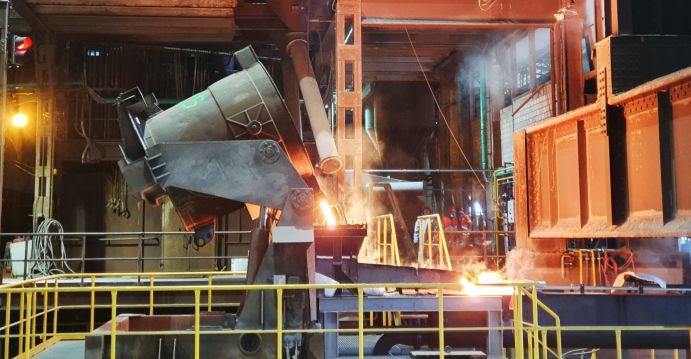PHöMixBeton - Process for the production of alkaline activated binders by melting mineral residues for an ecologically controlled mix design of concrete
In order to reduce CO2 emissions in the concrete industry, the BMBF-funded PHöMixBeton project is researching an alternative to the use of cement as "glue" in concrete and is investigating alkaline-activated binders from waste materials.

In Germany, the concrete and cement industry is responsible for about three percent of total CO2 emissions. In order to be able to produce concrete, the most widely used building material, in a more climate-friendly way, alternatives are being sought for cement, the binding agent used in concrete. This is because the high CO2 emissions are due in particular to the cement production processes.
So-called alkali-activated binders, which consist of a cement substitute and an alkaline activator, are promising. However, only those binders that manage with small amounts of activator are ecologically advantageous, such as blast furnace slag - a by-product of pig iron production.
New concrete "glue" from recycled waste materials
The PHöMixBeton project is pursuing a new path and investigating the use of previously unused secondary waste materials as binders. The advantage: these residual materials are available in the long term and can thus be sustainably reused and recycled. It is important that the residual materials can be activated as easily as possible in order to keep the energy used for the process - and the associated CO2 emissions - as low as possible. Examples of such so far unused residual materials are slags that are produced during the extraction and processing of metals or during waste incineration. These slags are available in large quantities in Germany and Europe. A challenge and at the same time an opportunity for the project is that these residual materials occur in many different plants and thus the compositions also vary greatly.
The aim of the project is to make the slags usable as a high-quality binder. The broad spectrum of possible raw materials holds great potential for a significant CO2 reduction in the concrete industry and for circular value creation and material utilisation.
The Federal Ministry of Education and Research is funding the PHöMixBeton project within its KlimPro-Industrie funding measure with around 1.9 million euros.
Project coordination
Dr. Christoph Kemper
EWW – Elektrowerk Weisweiler
Dürener Str. 487, 52249 Eschweiler
Phone: +49 2403 646386
E-Mail: kemper@elektrowerk.de
Last updated on



